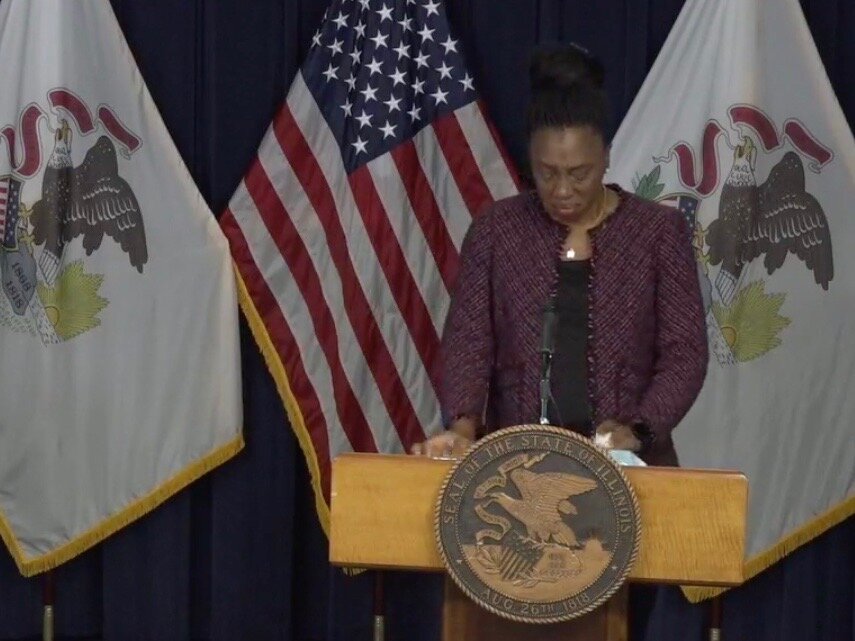'Fight the fatigue,' urges Dr. Ezike
Four regions face renewed COVID restrictions, half of state counties on warning list
Dr. Ngozi Ezike briefly struggles to maintain her composure during Friday’s coronavirus briefing at the Thompson Center. (Facebook/Gov. J.B. Pritzker)
By Ted Cox
The state’s public health director urged Illinoisans to “fight the fatigue” in battling the coronavirus pandemic Friday, even as she briefly struggled to maintain her own composure during a briefing at the Thompson Center.
“I understand how pandemic fatigue is striking everyone,” said Dr. Ngozi Ezike. “It’s real.”
“We are seeing the number of people with COVID-19 continue to increase,” she added, with 3,874 newly confirmed cases Friday bringing the state total to 364,033. Ezike said 31 new deaths attributed to the coronavirus took the statewide toll to 9,418.
When she said these were people who would not be sitting with family at the Thanksgiving dinner table this year, Ezike briefly lost it, turned her back to the camera in the online news conference, dried her eyes with a tissue, and returned to the briefing, saying, “My message to you is to stay strong” and “fight the fatigue.”
Praising Ezike’s relentless work throughout the pandemic this year, Gov. Pritzker called her “Superwoman” and joined her in urging Illinoisans to continue to do all they can to stop the spread of COVID-19.
“Wear a mask. Wear a mask,” Pritzker said, adding that combined with social distancing they prove effective in deterring transmission of the disease.
Pritzker and Ezike urged Illinoisans to continue to remain diligent in deterring transmission, even as four of the state’s 11 regions in the plan to Restore Illinois faced renewed restrictions to halt outbreaks.
Friday opened with four Chicago collar counties — Will and Kankakee, making up Region 7, and Kane and DuPage, making up Region 8 — facing renewed mitigation measures with indoor service halted at restaurants and bars, and gatherings limited to 25 people.
Pritzker had warned that was coming on Monday, when he announced the same restrictions were imposed on Region 5, southern Illinois.
In between, on Thursday, he announced he would be tightening restrictions still further on Region 1, northwest Illinois, after those measures failed to stop the testing positivity rate from rising to 11.9 percent. As of Sunday, groups even gathering outside at bars and restaurants will be limited to six rather than 10 people in towns and cities ranging from Rockford to Galena. Other meetings, social events, gatherings, and sports will be limited to 10 people, whether indoors or outside.
“We are not considering a statewide stay-at-home order,” like the one imposed this spring, Pritzker said, noting that is what the regional divisions are intended to prevent, targeting outbreaks where they occur. He added that State Police would join in efforts to warn scofflaw businesses, disperse gatherings that are too large, and potentially issue citations.
But outbreaks were spreading across the state. The Illinois Department of Public Health placed 51 counties — half the state total — on a formal warning list for increasing cases of COVID-19. That was up from 34, a third of all Illinois counties, last week, with the new list including Adams, Bond, Boone, Carroll, Cass, Christian, Clay, Clinton, Crawford, DeKalb, Douglas, Edwards, Fayette, Ford, Franklin, Gallatin, Greene, Hamilton, Henderson, Jersey, Jo Daviess, Johnson, Kane, Kendall, Knox, LaSalle, Lee, Macon, Macoupin, McDonough, McHenry, Mercer, Morgan, Moultrie, Ogle, Perry, Pike, Pulaski, Rock Island, Saline, Shelby, Stephenson, Union, Vermilion, Wabash, Warren, Wayne, Whiteside, Will, Williamson, and Winnebago counties.
“Although the reasons for counties reaching a warning level varies, some of the common factors for an increase in cases and outbreaks are associated with gatherings in people's homes, weddings and funerals, bars and clubs, university and college parties, as well as college sports teams, family gatherings, long-term-care facilities, correctional centers, schools, and cases among the community at large, especially people in their 20s,” IDPH reported. “Public health officials are observing businesses blatantly disregarding mitigation measures, people not social distancing, gathering in large groups, and not using face coverings.”
“It’s sad to see the numbers going up again,” Ezike said.
With the state reporting on more than 82,000 tests Friday, pushing the state total past 7.1 million, the seven-day statewide positivity rate stood at 5.6 percent.

